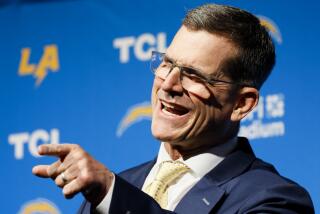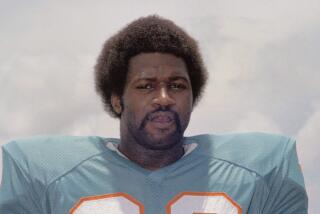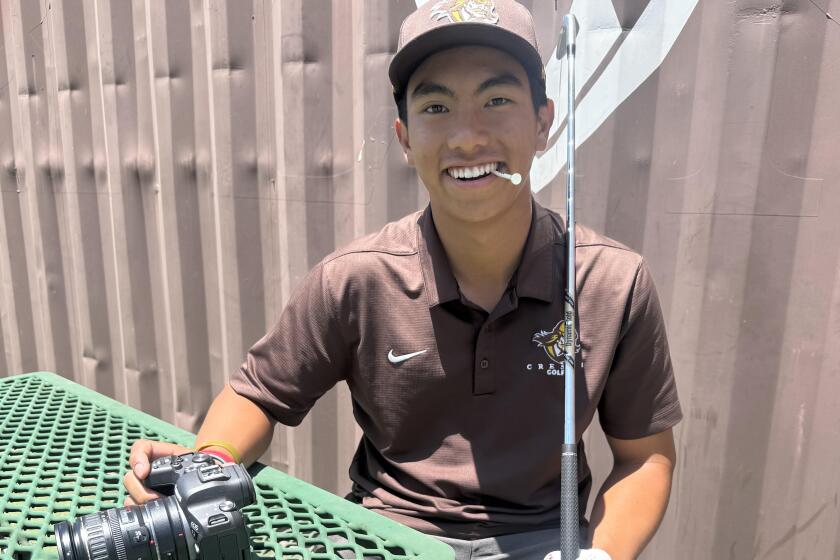Now They’re Miami Nice
- Share via
Question: “How are you going to stop Eric Crouch?”
Philip Buchanon Answer: “I don’t know. It’s gonna be kind of hard.”
What? You don’t ... know? Kind of ... hard?
This is not the response we expected earlier this week from a star cornerback on a University of Miami team preparing to play for a national championship against Crouch’s Nebraska.
This is so disappointing.
In the past, asking that question of a Miami player would be like putting a pipe in front of Howard Schnellenberger.
Hold your nose and wait for the smoke.
How are you going to stop Eric Crouch?
Ray Lewis would have said, “Eric who?”
Dennis Erickson would have said, “I don’t know, offer my guys $500 to take his head off?”
Warren Sapp would have said, “Dude, when I get rid of these munchies, I’m gonna clip the little roach.”
This is so depressing.
These top-ranked, unbeaten Hurricanes have been here for seven days now and not once have they swaggered, stalked, stolen, spiked, scammed or stripped.
Dozens of Southern California parties and--can this be right?--not one hosted by a municipal court judge.
“This a different decade, different personalities, different people,” said Buchanon.
Yeah, yeah, yeah, we heard all that. We just didn’t believe it.
For nearly two decades, dirty laundry fit Miami the way white socks fit Joe Paterno.
Their craziness became our comfort.
It gave us a platform from which to dive into the myriad problems of college athletics.
It gave us an example of all that is wrong with a society that coddles its youth.
OK, so it gave us three good columns a year.
And now?
The Hurricanes have become the Sugar Canes.
Michael Irvin help us.
Question: What do you think about the Rose Bowl?
Clinton Portis Answer: “It’s been wonderful. Everybody here has been wonderful.”
For shame.
And he calls himself a Miami running back?
Jerome Brown would have said, “Lemme get this flak jacket buttoned, then I’ll tell you.”
Lamar Thomas would have said, “Lemme tear off my helmet and do the Charleston, then I’ll tell you.”
Jimmy Johnson would have said, “Me, me, me, me, me.”
While espousing the advantages of improved character and renewed integrity, these new Hurricanes acknowledged that their behavior modification was inspired by something less complex.
“We changed because we didn’t have no choice,” said receiver Daryl Jones.
One hand was tied behind their backs by the NCAA.
After all, in a 14-scene NCAA video sent to every team illustrating outlawed plays and behavior, the first nine scenes featured Miami.
“It was so bad, I remember in high school in Dallas, an official came to our locker room and talked to us about too much celebrating, called it, ‘The Miami Rule,”’ remembered Jones, a senior from Dallas.
He smiled wistfully.
“Clowning around, taking off our helmets, doing flips ... if we could do it, we’d do it,” he said. “But we can’t.”
The other hand was tied by the coaching staff.
When Butch Davis took over from Dennis Erickson in 1995--sometime after Erickson “misplaced” Warren Sapp’s positive drug test in a desk drawer--the rules were changed.
Even though the team was on probation, the new players could not be.
Considering one in seven players off the 1994 squad had been arrested, the remodel was slow. But for once, things were steady.
“Butch came in and recruited only athletes with character,” admitted Coach Larry Coker, a former Davis assistant. “He wanted kids who would go to class, who would behave themselves, good kids.”
The team suffered at first but, then, well, remember their last game of 1998?
Nobody in these parts can forget. The Hurricanes not only whipped the potential national champion UCLA, 49-45, but did so without a taunt.
The Randal Hill swagger had been replaced by the Edgerrin James pummel.
It was the first clear sign that Miami could win without the vice.
Today, Coker is fighting tooth-and-swerve to make it a tradition.
“Every week, I show him a new dance, tell him, ‘Look what I got if I score!”’ Portis explained. “But every week, he goes, ‘Nahhhhhh.”’
What the coach doesn’t enforce, the biggest bullies on the team do.
If you can slip something past Coker, you won’t get it past the celebrated offensive line.
More impressive than giving up only four sacks, they allowed no public embarrassments.
“There are still times we have guys standing up in the room saying we need to do this or that,” explained center Brett Romberg. “We tell them, sit down, it’s not like that anymore. There’s no need for late hits. There’s no need to talk junk. Nobody can hear you talking junk on TV, can they?”
And when the linemen feel that a player is acting too big for his hip pads?
Ask sophomore lineman Vern Carey.
Earlier this season he was jumped in the locker room and slapped around with, um, sandals.
“Big Vern wasn’t so big anymore,” Romberg said.
Their best offensive lineman, senior tackle Bryant McKinnie, is the football version of Shane Battier--the best basketball player in the country who decided to stay in school through his senior season.
Their other celebrated lineman, senior tackle Joaquin Gonzalez, turned down a scholarship at Harvard to walk on at his favorite school.
The Hurricanes have five starters in graduate school.
Every senior is on schedule to graduate.
What in the name of Luther Campbell is this world coming to?
“Sure, hearing some of these stories makes you want to be back in the day ... the football dorms, getting paid to play,” Romberg said. “But this is about something different.”
Something quietly dignified and honorable.
Something deafening.
*
Bill Plaschke can be reached at bill.plaschke@latimes.com.
More to Read
Go beyond the scoreboard
Get the latest on L.A.'s teams in the daily Sports Report newsletter.
You may occasionally receive promotional content from the Los Angeles Times.











